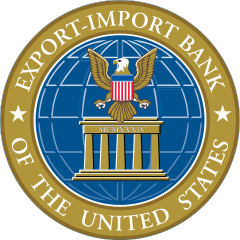
Ex-Im Closure Threatens Global Competitiveness of Exports
Threats to allow the charter of the Export-Import Bank of the United States (Ex-Im) to expire on September 30 have the potential to bring an essential cog in the American economy down with it- the global competitiveness of our exports.
Ex-Im provides loan guarantees to foreign purchasers of American goods and services as well as credit insurance to domestic companies looking to hedge against the risk of default. Stephen Myrow, a former chief of staff at Ex-Im has likened export credits to “nuclear missiles” in the arms race for global markets.
“You have them because other countries have them, and the thought of unilateral disarmament is not realistic.”
Without the insurance and loan guarantees provided by Ex-Im, U.S. companies that do business overseas will be forced to demand larger up-front cash payments, shorter repayment plans, and charge higher interest rates to international customers. With nearly all other developed countries utilizing some form of export credits, it would be hard to blame customers for taking their business elsewhere.
Consider Boeing, whose primary competitors Airbus and Siemens AG are among the largest recipients of export financing by Germany’s version of Ex-Im, IPEX Bank. Japan, South Korea, China, France, and Britain have all taken steps in recent years to expand the availability of export financing in order to boost global competitiveness.
While it is true that big-time players like Boeing, GE, and Caterpillar receive Ex-Im financing, nearly 90% (3,413) of the bank’s transaction were with small business last year. If Ex-Im’s charter is allowed to expire and the private sector assumes the role of export creditor, it will be these small businesses who are unable to secure deals with the likes of Bank of America who stand to lose the most. In its current form, the private sector is simply not structured to adequately play the role of Ex-Im.
Plain and simple, killing Ex-Im will hurt American competitiveness within the global economy, and small businesses who rely on export financing for the bulk of their transactions with be hit the hardest. There are plenty of examples of large and unnecessary government subsidies that drain taxpayer dollars, but attempting to cut off an institution that currently operates at a profit to taxpayers while simultaneously keeping our exports competitive is simply bad policy.
Economic power and competitiveness are more connected to national security than ever before. Because of institutions such as Ex-Im, the U.S. has by far the strongest and most resilient economy in the world, an asset that we can use to negotiate trade agreements such as the ongoing TTIP and TPP deals. Going forward, it is essential that we remain competitive in the global market with rivals like China and Russia. Allowing Ex-Im’s charter to expire is a big step in the wrong direction.






[…] Ex-Im Closure Threatens Global Competitiveness of Exports […]
[…] extensive Q&A section discussed the importance of the Export-Import Bank for financing energy projects in Eastern Europe, comments from Cheniere (one of the companies that […]